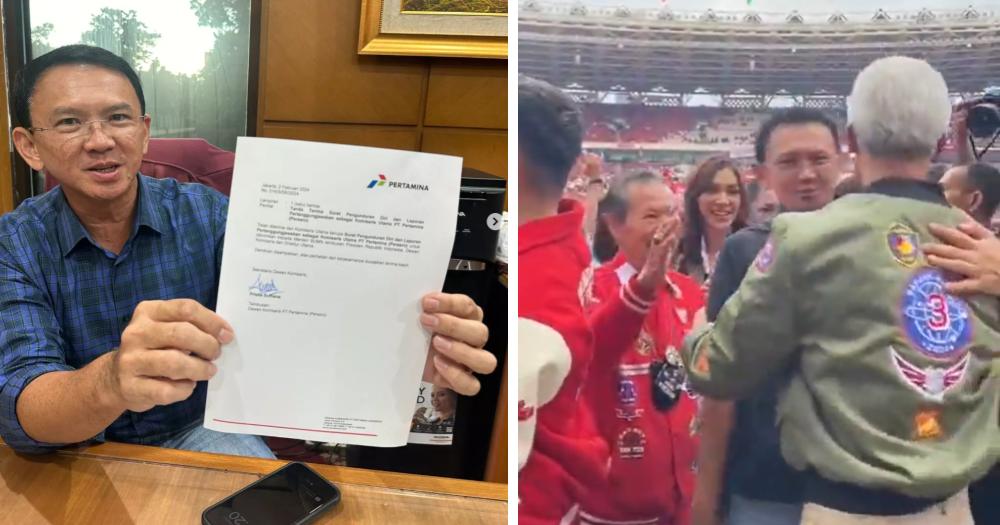Ganjar Pranowo, presidential candidate in Indonesia's upcoming election, has been endorsed by the controversial former governor of Jakarta, Basuki Tjahaja Purnama, commonly known as Ahok.
Ahok
Basuki Tjahaja Purnama, commonly known as Ahok, but preferring to be referred to by his initials BTP, was governor of Jakarta between 2014 and 2017.
He was jailed on charges of blasphemy in 2017, released in 2019, and has been serving as president commissioner of PT Pertamina, Indonesia’s state owned oil and gas corporation, since November 2019.
But on Feb. 2, Ahok announced that he was resigning from his post in order to campaign for presidential candidate Ganjar Pranowo.
On Feb. 3, at a stadium campaign event for Ganjar, the two men met on stage and shared a warm hug, with Ahok later being highlighted as a supporter.
Ahok Jokowi itu masa lalu. Ganjar Ahok itu masa depan 🤟🤟🤟#GanjarMahfud2024#GanjarMahfudM3nangDebat pic.twitter.com/EcIcNhhDuV
— Ina Surbakti Manik (@iina_surbakti) February 4, 2024
Ahok is experienced in Indonesian politics, having been in Indonesia’s house of representatives as a member of the Golkar party, and then later vice governor of Jakarta as part of Gerindra.
Gerindra is the party of Prabowo Subianto, one of Ganjar's opponents in the upcoming election.
Governor of Jakarta
It was Ahok’s time as vice governor that raised his profile, serving under Joko “Jokowi” Widodo who would go on to become president of Indonesia in 2014.
Ahok would become his successor as Jakarta’s governor, taking over the rest of his term.
But when Ahok ran for re-election in 2017, he was beset by accusations of blasphemy, and hardline religious groups took to the streets protesting him.
Ahok is a Chinese Christian, sparking worries that the movement against him was tinged with religious fundamentalism and bigotry.
Jokowi also distanced himself from Ahok following the controversy.
The incident saw Ahok ultimately convicted of insulting Islam, resigning the governorship, and serving 20 months of a two-year jail term.
The eventual winner of the 2017 governorship election was Anies Baswedan, who is now one of Ganjar’s opponents in the presidential election.
Anies, a former education minister, was accused of stoking tensions against Ahok for political purposes.
Struggle
Ahok joined the Indonesian Democratic Party of Struggle (PDI-P) two days after being released in 2019, but has largely stayed out of politics until recently.
PDI-P is the largest party in Indonesia’s house of representatives, led by political icon and former president Megawati Sukarnoputri.
It is also Jokowi's party, although tensions between him and Megawati have grown over the years to the point where there are questions over which candidate he supports, Ganjar (from the same party) or Prabowo (whose vice presidential candidate is Jokowi's son).
Ganjar is himself struggling in the polls, recording 21 per cent voter support against the 23 per cent of Anies Baswedan, former governor of Central Java.
According to Indikator Politik Indonesia’s polls from mid-January, as reported by the Jakarta Post, both are far behind Prabowo at 48 per cent.
In order to become president, Ganjar has to first hope that Prabowo does not win an outright victory in the first round, and that he can edge out Anies to reach the second round.
But even should he manage to do this, there is a chance that Ahok’s support may lead many of Anies’ supporters to switch to Prabowo rather than Ganjar.
Ganjar addressed these concerns head on when speaking to press, saying that Ahok's endorsement was based on the values that Ganjar's campaign represented.
Kompas quoted Ganjar as saying that anyone could join his campaign if they agreed with his values, and they could “take it or leave it”.
Resignation
Ahok's departure from Pertamina means he is the latest in a series of officials that have left national roles in order to openly support presidential candidates.
This includes Ganjar’s vice president Mahfud MD, who left the role of coordinating minister in Jokowi’s cabinet to campaign, albeit recently.
This is in contrast to statements made by Jokowi, who pointed out that under the law, the Indonesian president is allowed to support candidates while in office, as long as state resources not related to security are not used in the campaigns.
Related Stories
Top image via @basukibtp/Instagram & @iina_surbakti/Facebook

If you like what you read, follow us on Facebook, Instagram, Twitter and Telegram to get the latest updates.



